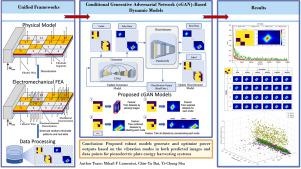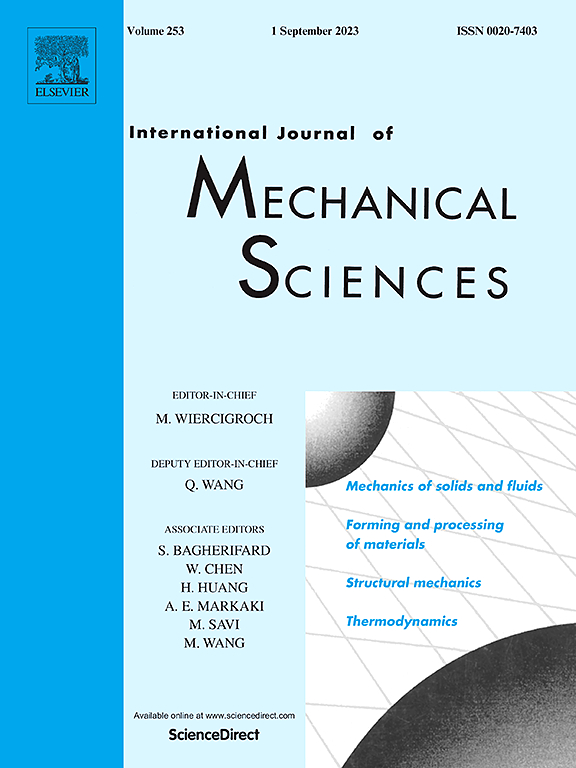Deep adversarial learning models for distribution patterns of piezoelectric plate energy harvesting
IF 7.1
1区 工程技术
Q1 ENGINEERING, MECHANICAL
International Journal of Mechanical Sciences
Pub Date : 2024-11-07
DOI:10.1016/j.ijmecsci.2024.109807
引用次数: 0
Abstract
This paper presents a novel approach utilizing piezoelectric plate structures with random electrode distribution patterns for energy harvesting applications across various vibration modes. For the first time, leveraging electromechanical Finite Element Analysis (eFEA) and data extraction techniques, we investigate the integration of conditional Generative Adversarial Networks (cGAN)-based dynamic models. The cGAN offers an effective technique for generating realistic synthetic data conditioned on input parameters, thereby enabling the creation of diverse and representative datasets for training energy harvesting systems. The integration of eFEA with cGAN opens up new possibilities for optimizing the design and performance of piezoelectric energy harvesters across various applications. Specifically, we explore four distinct cGAN models-based mechanics of energy harvesters by deploying distribution patterns. These models include training data generated by stacking simultaneously mode images, utilizing separate cGAN models for each mode, labeling images by mode, and concatenating all mode images into one. Our study focuses on assessing the effectiveness of these models in minimizing loss in cGAN-based power generation and predicting Structural Similarity Index Measure (SSIM) values, and more importantly, identifying the predicted data point outputs from the generated pixel image extractions. By analyzing the generated data from numerical model and its application in deep learning, we aim to enhance the understanding of the effects of distribution patterns and image processing techniques for optimal power generation and the effectiveness of piezoelectric energy harvesting systems across different vibration modes. The studies explore how different distribution patterns affect the power harvesting efficiency and frequency bandwidth, utilizing the generated datasets.

压电板能量采集分布模式的深度对抗学习模型
本文提出了一种新颖的方法,利用具有随机电极分布模式的压电板结构在各种振动模式下进行能量收集应用。利用机电有限元分析(eFEA)和数据提取技术,我们首次研究了基于条件生成对抗网络(cGAN)的动态模型的集成。cGAN 提供了一种有效的技术,可根据输入参数生成真实的合成数据,从而为训练能量收集系统创建多样化的代表性数据集。eFEA 与 cGAN 的集成为优化各种应用中压电能量收集器的设计和性能提供了新的可能性。具体来说,我们通过部署分布模式,探索了四种不同的基于 cGAN 模型的能量收集器力学。这些模型包括通过同时堆叠模式图像生成的训练数据、针对每种模式使用单独的 cGAN 模型、按模式标记图像以及将所有模式图像合并为一个。我们的研究重点是评估这些模型在最小化基于 cGAN 的功率生成和预测结构相似性指数(SSIM)值的损失方面的有效性,更重要的是,从生成的像素图像提取中识别预测的数据点输出。通过分析数值模型生成的数据及其在深度学习中的应用,我们旨在加深了解分布模式和图像处理技术对优化发电的影响,以及压电能量收集系统在不同振动模式下的有效性。研究利用生成的数据集,探索不同的分布模式如何影响功率采集效率和频率带宽。
本文章由计算机程序翻译,如有差异,请以英文原文为准。
求助全文
约1分钟内获得全文
求助全文
来源期刊

International Journal of Mechanical Sciences
工程技术-工程:机械
CiteScore
12.80
自引率
17.80%
发文量
769
审稿时长
19 days
期刊介绍:
The International Journal of Mechanical Sciences (IJMS) serves as a global platform for the publication and dissemination of original research that contributes to a deeper scientific understanding of the fundamental disciplines within mechanical, civil, and material engineering.
The primary focus of IJMS is to showcase innovative and ground-breaking work that utilizes analytical and computational modeling techniques, such as Finite Element Method (FEM), Boundary Element Method (BEM), and mesh-free methods, among others. These modeling methods are applied to diverse fields including rigid-body mechanics (e.g., dynamics, vibration, stability), structural mechanics, metal forming, advanced materials (e.g., metals, composites, cellular, smart) behavior and applications, impact mechanics, strain localization, and other nonlinear effects (e.g., large deflections, plasticity, fracture).
Additionally, IJMS covers the realms of fluid mechanics (both external and internal flows), tribology, thermodynamics, and materials processing. These subjects collectively form the core of the journal's content.
In summary, IJMS provides a prestigious platform for researchers to present their original contributions, shedding light on analytical and computational modeling methods in various areas of mechanical engineering, as well as exploring the behavior and application of advanced materials, fluid mechanics, thermodynamics, and materials processing.
 求助内容:
求助内容: 应助结果提醒方式:
应助结果提醒方式:


